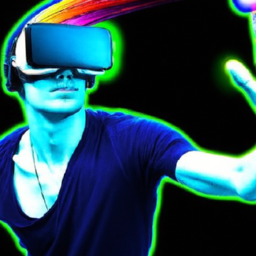The Future of Virtual Reality in Digital Marketing: Discussing the Potential Impact and Benefits of VR in Digital Marketing
Virtual Reality (VR) has rapidly evolved from a futuristic concept to a buzzing reality. With its immersive and interactive capabilities, VR has gained tremendous popularity across various industries, including gaming, entertainment, and healthcare. However, one sector that is poised to embrace the potential of VR is digital marketing.
The Rise of Virtual Reality
Virtual Reality refers to the use of computer technology to create a simulated 3D environment that can be explored and interacted with by an individual. VR is typically experienced through a headset and can provide a highly realistic and engaging user experience.
Over the past decade, VR technology has advanced significantly, allowing for more affordable and accessible devices. Major tech companies, such as Oculus, HTC, and Sony, have introduced consumer-friendly VR headsets, making the technology more mainstream.
How VR Can Impact Digital Marketing
The immersive nature of VR opens up a plethora of opportunities for digital marketers to connect with their target audience in entirely new ways. Let’s explore some potential impacts and benefits VR can bring to digital marketing:
Enhanced User Engagement
VR offers an unparalleled level of engagement compared to other digital marketing mediums. By immersing users in a virtual environment, brands can create unique and memorable experiences that captivate their audience. Whether it’s a virtual tour of a hotel, a product demonstration, or a virtual reality game related to a brand, VR can provide an interactive and immersive experience, driving deeper engagement.
Improved Brand Awareness and Recall
In a world saturated with advertisements, it’s crucial for brands to stand out and be memorable. VR can provide that competitive edge by offering interactive experiences that make a lasting impression. By engaging multiple senses and providing a more realistic experience, VR experiences have a higher chance of being remembered, leading to improved brand awareness and recall.
Targeted and Personalized Campaigns
VR technology can enable digital marketers to create personalized and targeted campaigns. Through data analysis and user input, brands can gather insights about users’ preferences and behavior in the virtual world. This information can be used to tailor marketing messages and experiences, creating a more personalized and relevant connection with each individual.
Virtual Shopping Experiences
E-commerce has undoubtedly changed the way we shop, but it still lacks the tangibility and sensory experience of physical retail. VR can bridge this gap by offering virtual shopping experiences. Imagine being able to try on clothes, walk through a virtual store, or visualize how furniture would look in your home, all from the comfort of your living room. Virtual shopping experiences can revolutionize the way consumers make purchasing decisions, leading to increased online sales.
Challenges and Limitations
While the potential of VR in digital marketing is promising, there are still challenges and limitations that need to be addressed. The cost of VR hardware, limited adoption by consumers, and the need for specialized content creation are some of the barriers that need to be overcome. However, as technology advances and VR becomes more affordable and accessible, these challenges are likely to diminish.
In conclusion, Virtual Reality has the potential to revolutionize digital marketing by providing immersive and interactive experiences that engage users on a deeper level. From enhanced user engagement to personalized campaigns and virtual shopping experiences, VR can open up a whole new world of possibilities for digital marketers. As the technology continues to evolve, it will be exciting to see how VR shapes the future of digital marketing.











